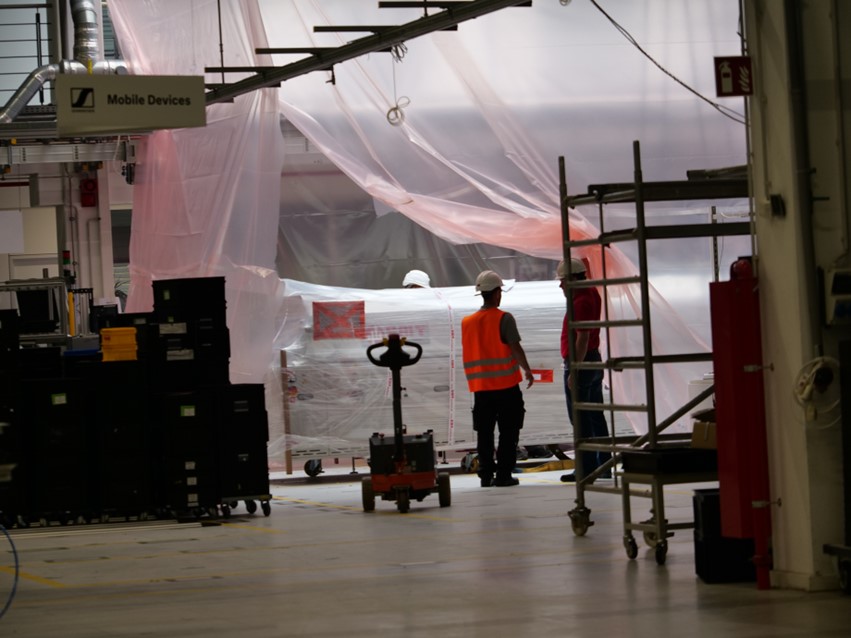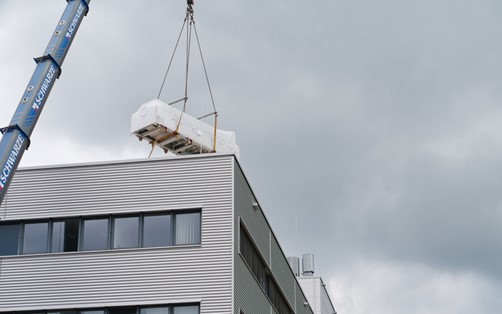Sennheiser Group Makes Ongoing Investment in German
Production Facility

Moving into the future of audio with Sennheiser's expansion of production capacity in Germany
Sennheiser Group is investing significantly in its own plants. In this way, the family-owned
company
is strengthening the independence of its production and ensuring its continued success in shaping
the future of the audio world. At its headquarters in Wedemark near Hanover, investments are
currently being made in state-of-the-art production technologies, particularly in printed circuit
board assembly. Under the banner of 'Moving into the Future', a series of expansion and
restructuring measures are taking place: The first step was to relocate an existing production line
in order to free up space. Then, two new reflow ovens were lifted through the roof of the production
hall by crane. This allows four assembly systems to fit in the production halls instead of the
previous two, thereby increasing capacity for printed circuit board production.
Sennheiser is further expanding its production capacity at its headquarters in Germany. Within
production, the relocation of 'Surface Mounted Device (SMD) Line 1' to create space for additional
printed circuit board assembly systems was only the beginning. "The relocation of this production
line system and the additional installation of new ones is one of several measures to strengthen our
production. By continuous investments in the production capacities at the Wedemark site, we are
making ourselves more independent of supply chains. In the past year, we have already invested
around 5 million euros here on site. This year, it is more than 14 million euros," explains Dr.
Andreas Fischer, Chief Operating Officer (COO) and member of the Executive Management Board.
"We
have been constantly improving our supply chains and continuously expanding our own production
capacities. This not only makes us future-proof for the long term, but also ensures we continue to
be a reliable partner for our customers," adds Co-CEO, Daniel Sennheiser.

By continuous investments in the production capacities at the Wedemark site, Sennheiser plans to
make it more independent of supply chains
The first SMD 1 production line has been in use at the Wedemark site since 2017; another line with
double the production capacity was put into operation in 2022. Together, they reliably produce
printed circuit boards on an assembly line. With the help of eight placement heads, the SMD 1 system
places components on a printed circuit board at an average speed of 25,000 pieces per hour. The
relocation of the machine means that there is now space for a total of four SMD placement systems on
the production floor instead of the previous two. With the arrival of the reflow ovens of the new
lines, the company can not only increase its printed circuit board production capacity several times
over, but also keep pace with technological developments. The new setup also allows for an optimized
material flow. The logistics of such a move are challenging and a special structure had to be built
to transport the huge parts of the machine. To install the reflow ovens, the roof of the production
hall had to be opened and the ovens were placed in the production area from above using a crane. The
fact that everything went smoothly is mainly due to the extensive preparation beforehand, says
Fischer. "Since the beginning of the year, we pre-produced around 10,000 printed circuit boards to
compensate for the loss of production during the move. Without the dedicated commitment of the
entire team, the relocation would not have been possible."
Moving into the Future
The move is part of a series of investments to strengthen the plant in Wedemark. The site in
Wennebostel specializes in technologies for high-precision, automated processes, and the manufacture
of high-end products, including the production of microphone capsules in its own clean room. To
sharpen this focus, the company invested in a new SMD line in 2022 and a digital tool management
system as well as ten additional production systems for microphone components in 2023. Other
upcoming measures include the addition of an automated SMD storage system.
The plant in Brașov, Romania, on the other hand, focuses on manual production as well as the final
testing and packaging of products. The audio specialist is also investing significantly in this
location as part of its sustainable growth strategy and tripled the available production space last
year. In 2023, a total of almost 13 million euros went into the expansion of the company's own
production sites. "With our own strong production facilities, we are investing in our core
competence - in the high quality of our products," says Andreas Fischer.